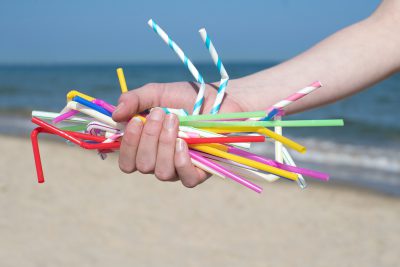Our oceans are under assault from plastic pollution with a report from the World Economic Forum saying that “there could be more plastic in the oceans than fish by 2050.” The plastic discarded by humans and through human activity can end up in the stomachs of marine animals or entangle them, ultimately causing them to die distressing and untimely deaths. Every day approximately eight million pieces of plastic pollution find their way into our oceans.
According to the report, the use of plastics has gone up 20-fold over the last 50 years and if steps aren’t taken to dispose of these properly, then “plastics in the ocean will outweigh fish pound for pound in 2050.” While some countries like Australia and India, as well as the European Parliament, have banned or seek to ban single-use plastics, we as responsible consumers can do our bit to help cut down the pollution caused by our consumption patterns. Here are twelve ways to reduce your plastic impact:
1) Take Your Own Bag
Do not accept single-use plastic bags at the store checkouts. Carry your own cloth or paper bags. Did you know that over 100,000 marine animals are killed annually by plastic bags?
2) Fill Your Own Bottles
Instead of buying bottled drinking water, carry a reusable bottle. Most restaurants and cafes are happy to give you a free refill. The US alone accounts for over 60 million plastic water bottles a day, most of which end up in landfills and the oceans. And another benefit of avoiding plastic drinks bottles is that we stop ingesting the plastics they contain.
3) Seek Eco-Friendly Packaging

There are many ways to package produce so, wherever possible, choose paper or cardboard packaging. And if there is a shop that refills existing containers in your neighbourhood, that is a great way to reduce our plastic impact.
4) Use Your Own Coffee Cups
Resist the urge to get your cup of joe as a takeaway in a disposable cup. Carry your thermos or travel mugs and some chains will offer you a discount. Though made of paper, disposable cups are lined with plastic and most are not recyclable. The UK alone accounts for 2.5 billion cups annually, and less than one percent of them get recycled.
5) Swap Plastic Wrap For Reusable Wraps
Cling films are non-recyclable and end up in landfills and oceans. Switch to the many reusable and sustainable options that range from parchment paper, tissues, reusable organic cotton wraps, wraps made from leaves, plant resin, and so on.
6) Use Stainless Steel Clothes’ Pegs
Switch to stainless steel clothes’ or wooden pegs. Unlike their plastic counterparts, these are more durable and can be recycled. The plastic pegs break easily and can end up in the stomachs of marine animals.
7) Use Reusable Food Pouches
Instead of grabbing those one-time-use food pouches for your leftovers, switch to reusable containers. Take it one step ahead and use your containers for takeaways too.
8) Switch to Stainless Steel or Bamboo Straws
The US alone uses over 500 million plastic straws daily and so many end up in the oceans. Some countries are banning the use of plastic straws, and you could help the planet by switching to and carrying your own stainless steel or bamboo straws.
9) Upgrade to Bamboo Toothbrushes
The US throws away about one billion toothbrushes every year. Not only can they injure ocean life, but they can also leach harmful chemicals into the water. You can now upgrade to the many eco-friendly options like bamboo toothbrushes, or petroleum-free silicone toothbrushes that require minimal replacement heads.
10) Ditch Shampoos, Body Washes, And Shower Gels With Microbeads

A lot of the shampoos and body washes contain plastic microbeads, promising a cleaner scrub or wash. Microplastics also leach out when we wash synthetic garments. The earlier estimate of five trillion pieces (5,000,000,000,000) of plastic in the oceans has been found to be a gross underestimation. These microplastics find their way into the food chain, ultimately poisoning all living beings. Ditch them and switch to organic shampoos, soap bars, and garments made from natural fibers.
11) Give Up Smoking
A new study has found that cigarette butts are among the greatest pollutants of the oceans. Quitting smoking is as good for the planet as it is for us.
12) Stop Eating Fish
And we have saved the biggest impact until last: stop eating fish.

The fishing industry is the ocean’s biggest plastic polluter. An enormous area of floating rubbish in the Pacific Ocean twice the size of France is comprised of trillions of pieces of plastic. While tiny fragments of plastic are the most numerous within the area almost half of the weight is composed of discarded fishing nets. It kills aquatic animals including sharks, rays, and turtles, as well as coastal birds.
The best way to help the planet and the ocean is to go vegan.




